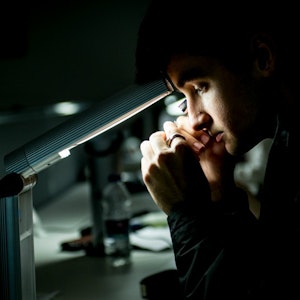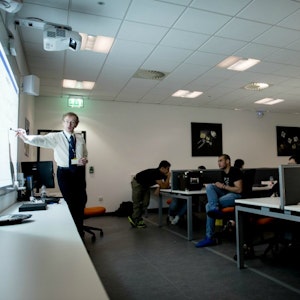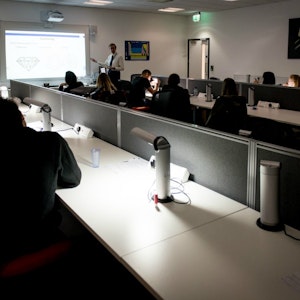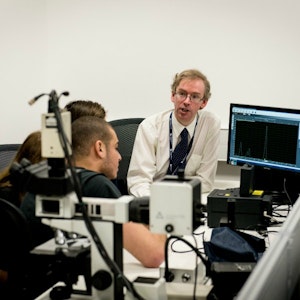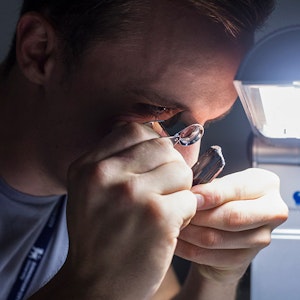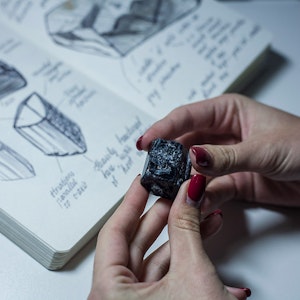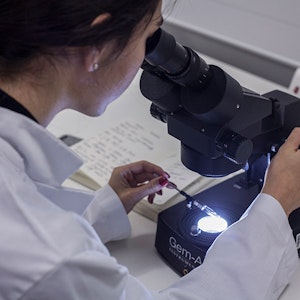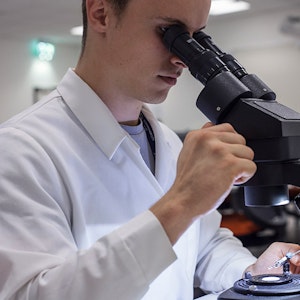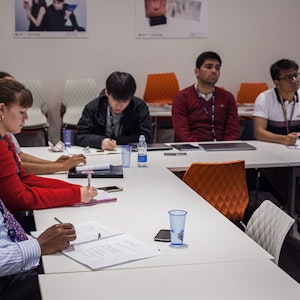
Gemmology Association (short courses) - Diamond Diploma / Diploma / Foundation Certificate
Currently viewing course to start in 2023/24 Entry.
Following the syllabus of the Gemmological Association of Great Britain (Gem-A), these courses offer a choice of introductory and/or further specialised education, covering the study and identification of gemstones and gemmological materials, whether natural, synthetic or artificial. Leading to a globally respected award, you can register for Fellowship of Gem-A on successful completion....
- Level CPD
- Study mode Short Course
- Location Assay Office
- Award Diamond Diploma / Diploma / Foundation Certificate
- Start date TBC
- School School of Jewellery
- Faculty Faculty of Arts, Design and Media
This course is:
Overview
Following the syllabus of the Gemmological Association of Great Britain (Gem-A), these courses offer a choice of introductory and/or further specialised education, covering the study and identification of gemstones and gemmological materials, whether natural, synthetic or artificial.
Leading to a globally respected award, you can register for Fellowship of Gem-A on successful completion.This is a highly regarded and prestigious gemmology qualification, recognised both in the UK and worldwide.
Gem-A Foundation Course
This course will introduce you to the basic principles in the science of gemmology. Through the use of specialised tools and training, you will gain an understanding and appreciation of natural, synthetic, imitation, and treated gemstones.
The course provides the basic information for gem identification, and is the first year of the Gem-A Gemmology Diploma course.
Gem-A Diploma Course
This course will build on the knowledge gained in the Gem-A Foundation course and will lead to a greater understanding of gemmology, and it’s use in professional testing environments. Successful completion of this course will allow you to apply for Gem-A’s membership status, which then allows use of the FGA post-nominals.
Gem-A Diamond Diploma Course
This course will introduce you to all aspects of diamonds, both in theory, and in practical. Through the use of gemmological equipment and training, you will gain an understanding and appreciation of natural, synthetic, imitation, and treated diamonds.
The course follows the Gem-A Diamond Diploma syllabus, leading to the Gem-A Diamond examinations. If you successfully complete the examinations, you will become eligible to apply for Gem-A membership, which will allow you the use of the DGA post-nominal letters.
Why Choose Us?
- You can take the Foundation Certificate before progressing to the more scientific study of the Diploma, then the prestigious Diamond Diploma – or choose the course that best suits your abilities and interests.
- Gem-A’s Gemmology Diploma is the most prestigious gemmological qualification in the gem and jewellery trade, while the Diamond Diploma is the ultimate education in diamonds.
- Following a step-by-step approach, the course covers both theory and its practical application, using a specialist laboratory with the most advanced equipment available.
- Based in Birmingham’s Jewellery Quarter, you get a chance to study where the industry works, picking up inspiration, contacts and entrepreneurial examples to follow.
- Our internationally-renowned School of Jewellery is the largest of its kind in Europe and has been delivering outstanding training since 1890.
Fees & How to Apply
UK students
Annual and modular tuition fees shown are applicable to the first year of study. The University reserves the right to increase fees for subsequent years of study in line with increases in inflation (capped at 5%) or to reflect changes in Government funding policies or changes agreed by Parliament.
Award: Diamond Diploma
Starting:
- Mode
- Duration
- Fees
- Short Course
- 9 months
-
TBC
Award: Diploma
Starting:
- Mode
- Duration
- Fees
- Short Course
- 9 months
-
TBC
Award: Foundation Certificate
Starting:
- Mode
- Duration
- Fees
- Short Course
- 9 months
-
TBC
International students
Sorry, this course is not available to International students.
The University reserves the right to increase fees in line with inflation based on the Retail Prices Index or to reflect changes in Government funding policies or changes agreed by Parliament up to a maximum of five per cent.
Fees
Gem-A Foundation Course
Fees are in two parts, £1300 payable to BCU, and £1195 payable direct to Gem-A.
Gem-A Diploma Course
Fees are in two parts, £2180 payable to BCU, and £1920 payable direct to Gem-A.
Gem-A Diamond Diploma Course
Fees are in two parts, £1300 payable to BCU, and £1645 payable direct to Gem-A.
Additional costs
Depending on your course, you may need to pay for professional examination fees. Information will be available at the start of the course.
Course in Depth
Gem-A Foundation Course
This course is taught by experienced BCU lecturers, and covers the Gem-A Foundation in Gemmology syllabus. As a requirement of the course, all students must purchase the Gem-A Foundation course notes (details provided upon application to the course).
The course will cover all aspects of gemmology, and can be taken with no prior experience, or educational requirements. A variety of gemstones are covered, both in rough and fashioned form, along with the geological processes by which they are formed. Optical, physical, and chemical properties are explained, along with the effects these have on the gemstone in terms of colour, hardness, and optical phenomenon. The course also covers a range of methods for producing gemstones synthetically, under laboratory conditions, and the methods by which these can be identified. Common treatments are also explained, along with the relevant identification features.
The course also contains a high percentage of practical work, during which you will learn to use a range of hand-held gemmological tools, from loupes to refractometers (and the principles underlying each test).
During the course you will be required to complete 4 online quizzes, which will count towards your final examination grade. Gem-A examinations are held in June, with the results being made available approximately 8 weeks later.
Successful completion of this course will enable you to progress to the Diploma year.
Gem-A Diploma Course
This course expands on the knowledge you gained in the Foundation course, and covers a greater range of gemstones. Additional testing methods, including laboratory techniques are introduced and explained, as well as an increased selection of synthesis methods and treatment techniques. Practical testing gains a greater emphasis during this course, with a dedicated practical examination being held in June, alongside 2 theory papers.
The course again follows the Gem-A syllabus, and so requires the purchase of the Diploma section of the Gem-A course notes. This also allows access to the Gem-A’s online learning resources, and a further 4 online assessments, which, as with the Foundation course, count towards the final examination grade. Students are also required to complete a gemmological project (on a choice of titles), and this again counts towards the final grading in the theory examination.
By completing this course you will be able to identify a range of gemstones, in both rough and cut forms, and be proficient in using a range of gemmological testing tools, which will enable you to test numerous other stones. You will also be able to talk confidently about the science of gemmology, treatments, and synthetic gemstones.
Gem-A Diamond Diploma Course
All aspects of diamonds and diamond grading will be covered in this course, which follows the Gem-A Diamond Diploma syllabus. The history of diamonds and diamond discoveries is covered, followed by an insight into the geological conditions necessary for diamond formation, and the techniques involved in diamond mining. Diamond cutting and the science behind diamond’s optical properties is outlined, along with the causes of colours, both natural and treated. Detection of these treatments, by standard gemmological tools and advanced lab equipment will also be explained. You will also learn how to differentiate diamond from it’s many simulants, such as cubic zirconia and synthetic moissanite, as well as an understanding of the processes involved in growing synthetic diamonds, and their detection.
On the practical side, you will learn to grade diamonds for all aspects seen on professional laboratory reports. Colour and clarity grading are the most commercially important features in the course, but grading for polish, symmetry, proportions and fluorescence are also covered. You will also receive training in the practical differentiation of diamond from similar stones, and the identification of certain treatments. Both theory and practical will be assessed by way of Gem-A’s trade examinations, which are held in June.
Facilities & Staff

Facilities
Our Gemmology students are based in new, state-of-the-art premises at Moreton Street in the Jewellery Quarter, within the Assay Office Birmingham building.
The purpose-built workshops are spacious and superbly well-equipped with equipment, samples and books. Within the department, there is access to some of the highest specification of equipment available for gemmological education in the world. Our students also have access to the further advanced equipment housed within the Assay office’s AnchorCert laboratory.
Workshops
Jewellery and Horology workshops are located on the main School of Jewellery site complemented with a Technology Hub including state of the art digital manufacturing equipment.
Gemmology
The Gemmology department is furnished with high specification interactive lecture facilities and is situated within the working environment of Birmingham’s Assay Office.
IT and library
Computers and laptops have the latest Adobe software and you will be given access to Lynda.com as a source of great tutorials and advice to support your studies. The School of Jewellery has its own specialist library with a comprehensive range of international periodicals and access to the Mintel Report.
Exhibitions
Our students love the friendly, welcoming atmosphere of the School and return year on year to our annual exhibitions.
Our staff
Michelle McCormick
Lecturer
After twenty years of working in the Jewellery and Gemstone industry and studying for numerous trade qualifications, Michelle graduated from the School of Jewellery with a First-class BSc (Hons) in Gemmology and Jewellery studies in 2015.
More about MichelleEnquiries
Apply for the Gemmology Diploma course direct to School of Jewellery, Vittoria Street:
Tel: +44 (0)121 331 6477
Email: jewellery@bcu.ac.uk



